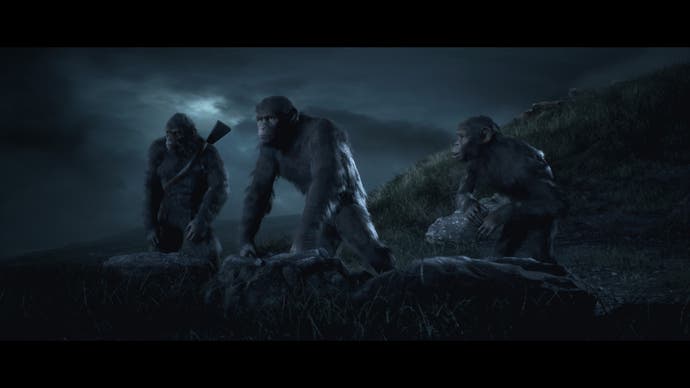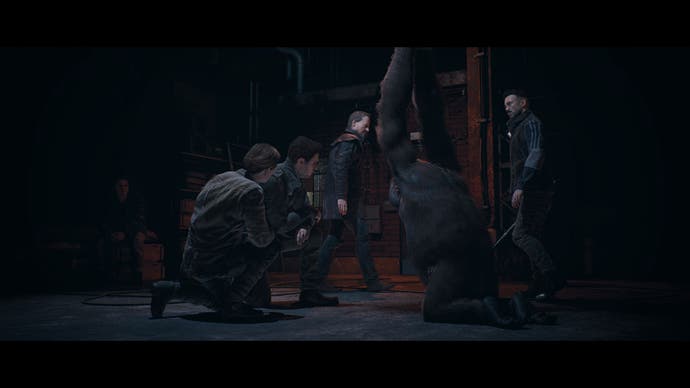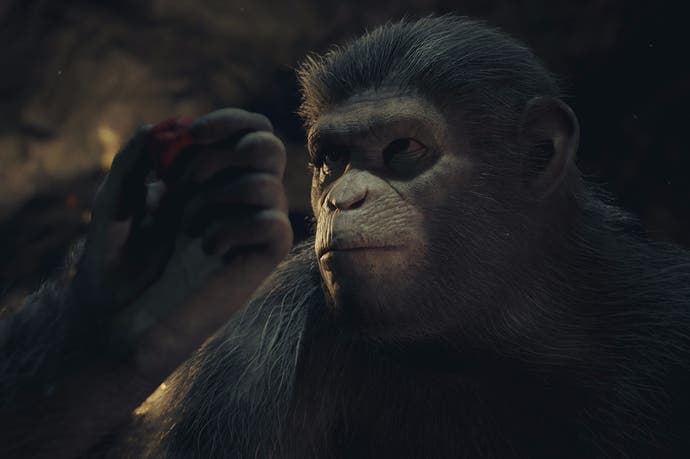Planet of the Apes: Last Frontier review
Gorilla games.
After Hidden Agenda, here's this week's second entry in the "sub-David Cage" category of cinematic narrative games - although that categorisation is halfway unfair to both. Hidden Agenda is boring and misconceived, but structurally innovative; Planet of the Apes: Last Frontier, by contrast, has its storytelling head screwed on, but only pays lip service to player choice. As easy as it is to poke holes in Cage's barmy plots, his vainglory and his clumsy gravitas, playing a couple of less successful imitators is a quick way to remind yourself that Quantic Dream has a rare mastery of the smoke and mirrors required to make a player feel involved in a scene.
Last Frontier is a spin-off from the recent movie series, set between 2014's Dawn of the Planet of the Apes and this year's War for the Planet of the Apes. There's no direct connection to the plot of the films: the game follows a breakaway tribe of talking apes who settle in the Rocky mountains and cross paths, violently, with a local enclave of human survivors of the flu that has ravaged the world's population. This game, though, is not just a spin-off in the narrative sense - there's a direct link here to the film productions. Last Frontier was developed by London's Imaginati Studios and published by The Imaginarium, a production company specialising in performance capture technology, which captured and rendered the impressively subtle and expressive ape performances in the movies (including studio co-founder Andy Serkis as Caesar).
For the Imaginarium and the Apes license-holders at Fox, then, this game is about seeing if the technology used in the movies' making can be used (or, probably, "leveraged") to make what are doubtless being referred to in boardrooms as "cross-media experiences". What it means for you and me is that this game was made by people who could draw directly on a wealth of experience in acting, rendering and animating totally believable and empathetic characters who just happen to be chimpanzees, gorillas and orangutans. It really shows - to the extent that the human characters seem wooden and unrelatable by comparison, and the decision to dedicate equal amounts of screen time to the primate and human communities feels like a mistake.
An elder chimp called Khan has led his tribe into the mountains, where they are safe from human persecution, but where food is in too short supply and the winter is closing in. You follow Khan's middle son Bryn, who is torn between his aggressive elder brother Tola, fearful younger brother Juno, and the wise but perhaps timid counsel of an orangutan called Clarence as he tries to chart a future course for the tribe. Meanwhile, in a barricaded town in the valley below, a widow called Jess inherits the leadership of the community from her husband and faces a similar food shortage and a similar dissenting chorus: a compassionate medic, an ornery rancher and a suspicious pair of drifters who claim to be expert ape hunters. When Tola leads a disastrous raid on the humans' cattle, conflict is inevitable.

There are a few ways this story can go depending on the choices you make. You steer Bryn and Jess through their murky political and ethical waters with a simple left or right tap to choose conversational options, and are occasionally offered a button press to act - or not - during an action scene. As with Hidden Agenda, you can use Sony's PlayLink tech to do all this via your phone and to involve friends in the decision-making in a multiplayer mode. This is simpler than Hidden Agenda's, requiring unanimous agreement but giving players an override option in turn to resolve any deadlocks; it works OK, but considerably slows down an already very low-key game. Also, I found the PlayLink implementation was unreliable. I lost control completely during one crucial action sequence, and thereafter fell back on using a pad for playing the game solo. (The game will be coming to platforms other than PlayStation 4 later, hence the conventional control option.)
The interaction is extremely basic, although there is a lot of it, with options coming thick and fast and offering what seems quite a granular level of control over the flow of conversation. But much of this is illusory. Apart from at a handful of set-piece junctures, events have a way of unfolding the way they were always going to, regardless of your input, and it can be hard to sustain your interest when it doesn't feel like your choices are having any impact on a pretty tightly controlled story.
On the other hand, that story does at least offer characters and situations that are drawn with enough delineation and warmth that you will care about them and feel able to make choices based on gut feeling, conscience and a sense of who the character is. This is truer of the ape plotline, partly because the performances are so well captured and translated, and partly because the stark context of the ape tribe cuts through to the core of the characters and the elemental themes of the drama: family, the ethics of survival, the civilised use of power. The human drama, meanwhile, comes freighted with so many layers of reference and influence, from circle-the-wagons Westerns to The Walking Dead, that you struggle to see the wood for the clichés.

It's harder to care about the humans in the Planet of the Apes films, too, despite them being incorporated by real live actors of the calibre of John Lithgow and Woody Harrelson. The novelty and spectacle of seeing such soulful and delicate performances brought to digitised life is distracting, to be sure, but you also can't fail to notice the ironical and compassionate treatment of the apes as more human than human, and mankind as less. There is even a provocative political dimension to the apes' struggle for consciousness and freedom from the physical and spiritual sickness of human civilisation.
Planet of the Apes: Last Frontier doesn't exactly explore these themes - in fact, it's careful to look for equivalence between ape and man - but it does inherit the surprisingly serious moral tone of the films, and this fits its simple survival storyline well. What an irony and a shame, then, that the person who is left dehumanised by this game - pushing buttons to no effect, thinking and responding to what's happening, but feeling ignored - is the player.

